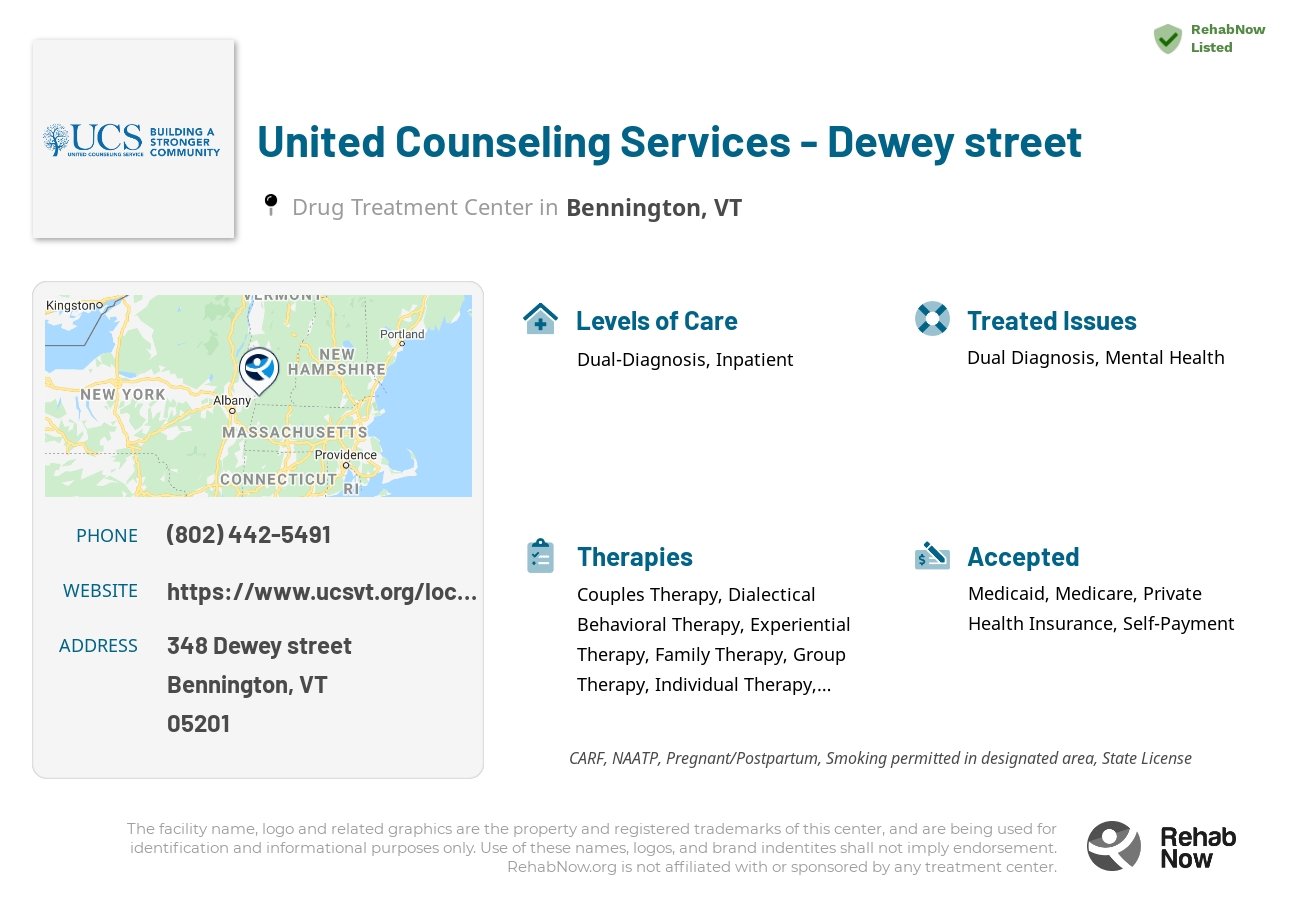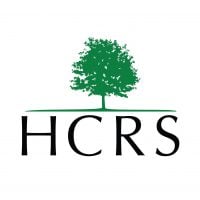United Counseling Services - Dewey street
Drug Rehab Center in Bennington, Vermont
United Counseling Services - Dewey Street in Bennington, Vermont offers mental health and substance abuse services, including outpatient and residential treatment, personalized treatment plans, and various therapy options, with a focus on evidence-based practices and excellent inpatient care.
About This Vermont Facility
United Counseling Services - Dewey Street in Bennington, Vermont offers a wide range of mental health and substance abuse services to adults and adolescents. Established in 1975, the center has been providing quality and affordable care to the Bennington and surrounding community for more than 45 years. Their staff of psychiatrists, therapists, and counselors specialize in treating addictions, substance abuse, and mental health issues. They work with each individual to create a personalized and comprehensive treatment plan that is tailored to their individual needs.
United Counseling Services - Dewey Street provides a range of services for addiction and substance abuse. Their counselors are experienced in using evidence-based practices to treat addiction. They offer outpatient treatment, intensive residential treatment, and medication-assisted treatment. They also provide relapse prevention and aftercare services, as well as other recovery support services. Patients can participate in group, individual, and family therapy to help them better understand their struggles and learn effective coping strategies.
United Counseling Services - Dewey Street is accredited by the Joint Commission and has been recognized with a Distinction Award for excellent inpatient care. They are licensed by the Vermont Department of Mental Health and are members of the National Association of Addiction Treatment Providers. They accept most major health insurance plans and offer a sliding-fee scale for those who qualify. They also have a wide range of payment options and a comprehensive financial hardship program for those who are in need of assistance.
Genders
Ages
Modality
Additional
Conditions and Issues Treated
When addiction and psychiatric issues co-occur, the addict’s recovery is more successful when both conditions are treated. A dual diagnosis refers to a condition in which the patient is diagnosed with two health issues: addiction and bipolar disorder. The most common therapies are psychotherapy, behavioral therapy, spiritual counseling, 12-step programs, and medication management.
Levels of Care Offered at United Counseling Services - Dewey street
This center offers a variety of custom treatment tailored to individual recovery. Currently available are Dual-Diagnosis, Inpatient, with additional therapies available as listed below.
Inpatient treatment centers offer a safe, secure, and often medically supervised environment for drug or alcohol-addicted individuals. Many of these facilities are equipped to provide detoxification, treatment for co-occurring mental health disorders, and aftercare programs. The patient typically spends 28 to 30 days at the facility and will receive extensive drug counseling.
Therapies & Programs
At United Counseling Services - Dewey street , to learn from past mistakes and improve one’s situation, the recovering person meets individually with a therapist. The counselor or therapist will address addiction causes, triggers, mental issues, dual diagnosis, and aftercare plans during this time. This is a very intense and challenging process. Some clients find it easier to open up to someone other than family or friends who understand their struggles with addiction.
Couples therapy sessions are typically used to help couples in recovery from drug addiction work through their issues. These types of sessions can be beneficial for many reasons, including the fact that they add a layer of accountability when both partners in a couple are recovering from addiction.
Therapy can also provide addicts with another effective way to cope with stress and avoid relapse during difficult situations. This type of therapy can help improve communication with their partners, which can strengthen the relationship and prevent future problems that might lead to relapse.
Family therapy is a crucial part of drug treatment and getting sober. It is one of the most effective ways to help addicts stay on the path to long-term sobriety. An addict’s family can play a vital part in helping them to avoid relapse. They can spot the warning signs and help them get back on track.
In group therapy, recovering addicts meet with a therapist and other people in recovery. Some groups are closed, meaning only people who share the same addiction or problem can attend. Others are open to anyone who wants to stop using drugs or drinking alcohol. Group therapy sessions typically focus on one topic each week or month so that recovering addicts can discuss issues they face daily.
Trauma therapy allows people to face and learn from past traumas.
Many people suffer childhood traumas that lead to adult addiction. During treatment at United Counseling Services - Dewey street [/type], you can move forward in your recovery and reclaim your sober future! Trauma is a common cause of psychological disorders like Addiction Disorder. It’s common in Addictive Disorders patients because traumatized people have strong emotions or thoughts that lead to addictive behaviors.
Dialectical Behavior Therapy (DBT) is a type of therapy created in the late 1980s and early 1990s. It was designed to help people with high rates of suicidal behavior.
The goal of DBT is to teach mindfulness, distress tolerance, emotion regulation, and interpersonal effectiveness to help people learn how to live a life that is no longer controlled by overwhelming emotions and urges.
DBT is beneficial in treating drug addiction because it helps patients understand and cope with their cravings for drugs or alcohol rather than turning to those substances as a way of coping.
Cognitive Behavioral Therapy (CBT) is based on the idea that how we feel, think and act all interact together. It helps people explore their thoughts for problems (or false beliefs) that influence their mood and actions. CBT is very goal-oriented, which means that the therapist and patient work together on a specific problem. In addition to helping a client focus on thoughts that can be changed, CBT also allows them to take an active role in their treatment. Our thoughts determine our feelings and behaviors; our feelings affect our thoughts, and our behaviors change our thoughts and feelings.
Nutrition therapy has been used to help drug addicts for decades. Many early reports on addiction treatment indicate that some patients recovered from the “satisfying power of food”. For years, this phenomenon has been utilized as a treatment modality in eating disorders for adults, adolescents, and children.
Specific nutrients have been identified that influence neurotransmitters associated with reward pathways of the brain. Studies have shown that carbohydrate loading with complex carbohydrates to elevate serotonin levels was effective in treating bulimia nervosa. This approach prompted researchers to explore the use of this type of nutritional intervention in other disorders.
The goal of nicotine replacement therapy is to provide a safe alternative for people trying to quit smoking. It does this by giving small doses of nicotine that help manage cravings while breaking habits associated with cigarettes.
Nicotine Replacement Therapy (NRTC) uses products like skin patches and gum that deliver low-dose nicotine, which prevents cravings in those quitting. This makes it easier for them to make a gradual transition from smoker to non-smoker.
Patient Experience
Experiential Therapy at United Counseling Services - Dewey street
Experiential Therapy is a different way of thinking about addiction treatment. It uses physical activities to help work through troubling emotions, memories, and trauma that are sources of psychological issues like addiction.
Experiential Therapy can be an effective option for those who have struggled with past traumas or challenges associated with life decisions such as drug use. The non-traditional approach helps people deal more effectively with these struggles. It also allows them to gain new perspectives on their behavior patterns by recreating experiences in healthy ways rather than continuing old habits that may no longer serve them.
Payment Options Accepted
For specific insurance or payment methods please contact us.
Is your insurance accepted?
Ask an expert, call (888) 674-0062
United Counseling Services Associated Centers
Discover treatment facilities under the same provider.
- United Counseling Services - Northshire in Manchester Center, VT
- United Counseling Services - Ledgehill Road in Bennington, VT
- United Counseling Services - Dewey street in Bennington, VT
- United Counseling Service - Bennington in Bennington, VT
- United Counseling Services - Manchester Center in Manchester Center, VT
Learn More About United Counseling Services Centers
Additional Details
Specifics, location, and helpful extra information.
Bennington, Vermont 5201 Phone Number(802) 442-5491 Meta DetailsUpdated November 25, 2023
Staff Verified
Patient Reviews
There are no reviews yet. Be the first one to write one.
Bennington, Vermont Addiction Information
Vermont has the highest rate of illicit drug abuse in the nation. A third of all Vermonters who are addicted to drugs admit to first having abused prescription drugs. The largest drug threat in Vermont is opioids. Fentanyl, dubbed the most dangerous drug in America, is responsible for more than half of all opioid-related deaths in Vermont. A third of all residents aged 12 and older who are addicted to drugs admit to first having abused prescription drugs. In many overdose cases, cocaine is also a contributing factor.
Bennington, Vermont has a high rate of drug and alcohol addiction. 78% of drug overdose deaths in Bennington involve an opioid. The number of people seeking treatment for heroin addiction increased by 34% from 2016 to 2017. Bennington's main problems associated with drug addiction include crime, poverty, and health problems. The treatment process for drug addiction in Bennington will vary depending on the severity of the addiction and the person's individual needs.
Treatment in Nearby Cities
- Colchester, VT (115.8 mi.)
- Barre, VT (98.3 mi.)
- Hartford, VT (69.2 mi.)
- Brattleboro, VT (32.8 mi.)
- Underhill, VT (115.3 mi.)
Centers near United Counseling Services - Dewey street
The facility name, logo and brand are the property and registered trademarks of United Counseling Services - Dewey street, and are being used for identification and informational purposes only. Use of these names, logos and brands shall not imply endorsement. RehabNow.org is not affiliated with or sponsored by United Counseling Services - Dewey street.









